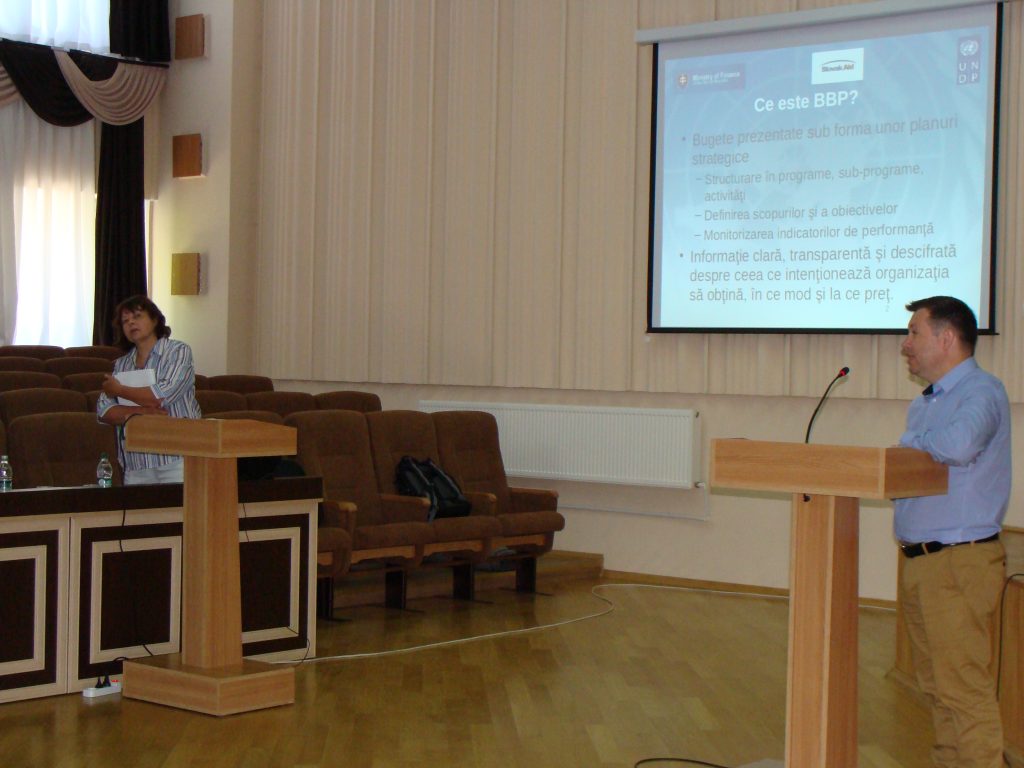More than hundred Moldovan participants were trained during on-the-job trainings for LPAs in June-July 2016. It’s interesting to read how do they evaluate the objective of the training, its duration and the guidance provided by international expert.
Public Finance for Development (PFD) Programme with the goal – to strengthen and enhance national capacities within partner countries in the area of public finance has been implemented in Moldova since 2011. First project: ‘Capacity development for program budgeting (PBB) in Moldova’ was in 2015 followed by another partnership project: ‘Strengthening capacities of the Congress of Local Authorities of Moldova in the area of public finance’. PFD programme is exclusively funded by the Ministry of Finance of the Slovak Republic (MF SR) and implemented by UNDP for Europe and CIS.
The objective of first project is to support the Ministry of Finance of Moldova in implementation of program budgeting in the government of Moldova and to create conditions for sustainable capacity development for PBB in central and local public authorities (CPAs and LPAs) of Moldova. A larger number of civil servants were trained during on-the-job trainings at the workplace across Moldova since 2013 with an aim to assist budget and policy specialists to formulate goals, objectives and indicators of program budges. The feedback from participants collected during the on-the-job trainings conducted for 4 Local Public Authorities (Level II raions: Drochia, Leova, Ocnita and Singerei) in June-July 2015 was very positive.
 One year later (in June-July 2016) other more than 100 participants were trained during on-the-job trainings for LPAs in 4 other Raions: Nisporeni, Ialoveni, Criuleni and Cahul. Based on the Survey Results from Evaluation forms 100 % of the respondents agreed that the objective of the on-the-job training was achieved. According to them the training was absolutely necessary for the learning process of program budgeting, capacity building, and strengthening of abilities to understand, reorientation of education towards sustainable development. It provided them with practical, meaningful examples and helped them to understand programs’ implementation from its goals, activities up to results. They ask for organizing such trainings more often.
One year later (in June-July 2016) other more than 100 participants were trained during on-the-job trainings for LPAs in 4 other Raions: Nisporeni, Ialoveni, Criuleni and Cahul. Based on the Survey Results from Evaluation forms 100 % of the respondents agreed that the objective of the on-the-job training was achieved. According to them the training was absolutely necessary for the learning process of program budgeting, capacity building, and strengthening of abilities to understand, reorientation of education towards sustainable development. It provided them with practical, meaningful examples and helped them to understand programs’ implementation from its goals, activities up to results. They ask for organizing such trainings more often.
The respondents agreed that the guidance provided by the international expert was useful and contributes to their work; the duration of the on-the-job training was sufficient. Each section and department were trained, which led to clarity in all fields. Moldovan participants expressed their gratitude for provision of useful trainings and a wish to organize such trainings more often. Following quote expresses opinion of most of them: “It’s good to share experiences, to improve the knowledge and to avoid possible mistakes during program’s implementation”. Most of the comments and proposals were related to the continuity of the trainings – the participants would like to attend more similar trainings.


